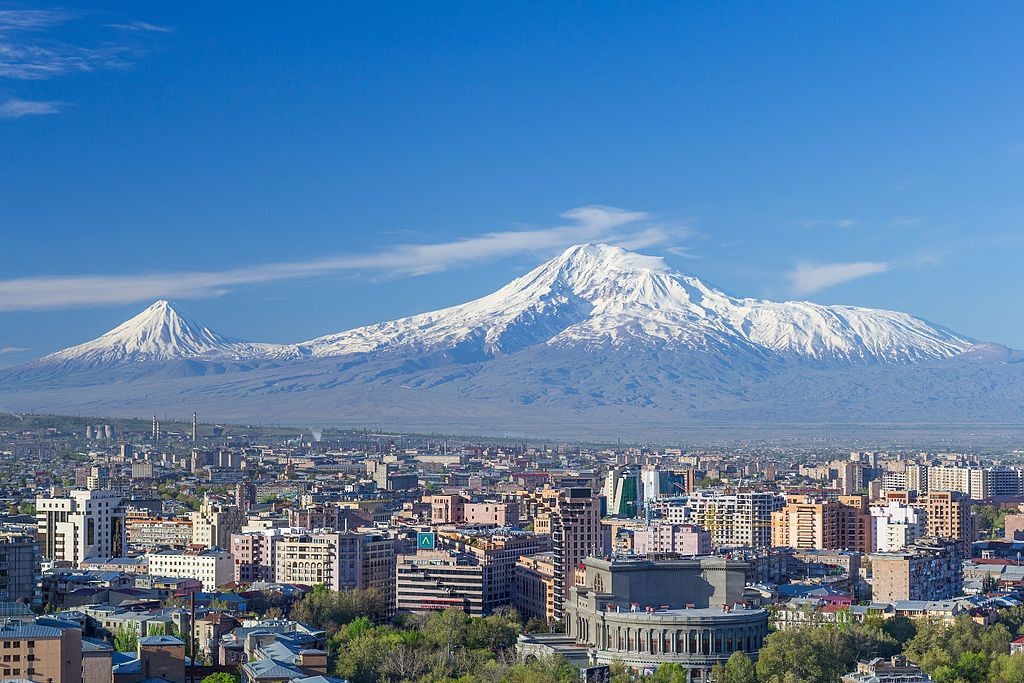
Excerpt from Silence of Color, by Narine Abgarian, translated from Russian
Summer is a careless, lighthearted, fleeting time; there's so much joy in it that it seems to last for the rest of your life. Yet on tin garage roofs there are stretched-out carpets – yellow, blue, ruby-apricot – washed by the motley foliage. Autumn is coming soon, very soon.
I'm having honey figs, soft goat cheese and a bit of dry wine for supper, paired with an old black-and-white movie where enamored Bogart follows Hepburn to Paris. Coming back to that naïve and beautiful world gone into oblivion is worthwhile in Yerevan if anywhere, for Yerevan can miraculously echo anything that's dear to the heart and soul. This city knows everything about real beauty.
…There's so little left of summer, just a morsel; there's just enough left of summer to say goodbye and let it go.
***
Flying out of Armenia is like dying a little. You leave her feeling as if your heart’s been ripped out and replaced with ink. Seeing you off are: the dark-ash-colored evening sky with a sketch of the biblical mountain; an orange slice of the departing sun; a fuzzy strip of urban streetlights; an ancient car, carefully parked next to the huge letters “NO PARKING”; and a misplaced school notebook on a bench.
***
Wintry Yerevan reminds one of an old movie: the snowstormy city shivers with cold, smells of bitter coffee and tart wine, and its reflections in shop windows are like black-and-white frames. During the day, full of cold sunshine, the city makes golden branches of age-old plane trees overlap above your head – and you’ve forgotten they don’t shed their leaves until spring, keep rustling their weather-worn foliage to the whisper of falling snow, which this year is so plentiful that it seems that winter itself was invented here, in this stony refuge of starless nights and loud winds.
At evening time, Yerevan is confused. It can’t accept compromise or moderateness, and so, finding itself in intertemporality, it wanders around as a lonely shadow under icicle-ridden ledges, catching rare drips from the thawing ice with cold fingers. At evening time, the city has a faint flavor of all things from your faraway childhood, for no good reason enshrined in your memory: vinyls, bulky record players, art catalogues worn from a myriad fingers leafing through them, the lampshade covered with fabric that feels coarse to the touch and that Mom comically calls ‘crushed velvet’. At evening time, Yerevan is lost and restless; it resembles someone’s jaunty business card, forgotten on a table's edge.
At night, Yerevan’s sound is jazz. The indisputable, real one: Nina Simone, Billie Holiday, Ella Fitzgerald, Louis Armstrong, Duke Ellington. Jazz is the endless sleep of the city’s old courtyards, of its neon-signless narrow lanes and back streets. You can hear it even where it can’t be, for it hadn’t been invented yet, – in Toros Roslin’s miniatures or in the ancient Mashtotsian alphabet, where letters are folded palms, some harvesting rainwater, others shielding eyes from the blinding sun. Everyone, literally every passerby, be that a teenager late for his date, a girl weeping after a bitter breakup, or a madman who remembers the city like it never was, is a part of the jazz.
In the morning, Yerevan wakes you up with the voices of your kindred ones. It’s gentle and tender and is dear to you precisely because its voice is the voice of your soul, where the only emotion present is love. You feel incredibly silly and predictable – because you're 46, because you’ve had a whole life’s worth of everything; yet, to John Coltrane’s sentimental mood, Yerevan wakes you up as only it can – barev, tsavt tanem, vonts es? (‘Hi! I'll take your pain, how are you?’ in Armenian.) And, for the first time in many years, you start to fear that tomorrow this might not come again, and so you reply, choking with excitement and with the joy of recognition – feeling means living – tsavt tanem, I’m excellent, I’m always excellent when you're nearby!
This is so beautiful!
@Jam_ I agree :) She writes a lot about Armenia, and there's one book translated into English, called 'Three Apples Fell from the Sky'.